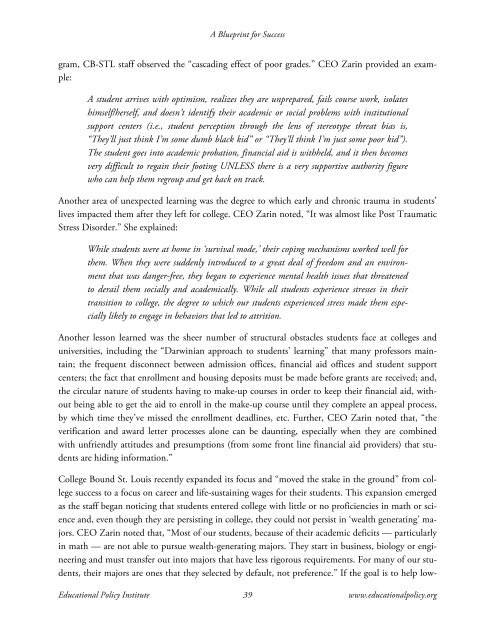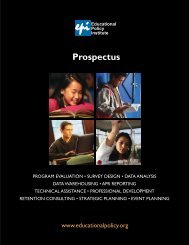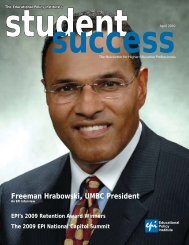A BluePrint for Success: Case Studies of Successful - Educational ...
A BluePrint for Success: Case Studies of Successful - Educational ...
A BluePrint for Success: Case Studies of Successful - Educational ...
You also want an ePaper? Increase the reach of your titles
YUMPU automatically turns print PDFs into web optimized ePapers that Google loves.
A Blueprint <strong>for</strong> <strong>Success</strong><br />
gram, CB-STL staff observed the “cascading effect <strong>of</strong> poor grades.” CEO Zarin provided an example:<br />
A student arrives with optimism, realizes they are unprepared, fails course work, isolates<br />
himself/herself, and doesn’t identify their academic or social problems with institutional<br />
support centers (i.e., student perception through the lens <strong>of</strong> stereotype threat bias is,<br />
“They’ll just think I’m some dumb black kid” or “They’ll think I’m just some poor kid”).<br />
The student goes into academic probation, financial aid is withheld, and it then becomes<br />
very difficult to regain their footing UNLESS there is a very supportive authority figure<br />
who can help them regroup and get back on track.<br />
Another area <strong>of</strong> unexpected learning was the degree to which early and chronic trauma in students’<br />
lives impacted them after they left <strong>for</strong> college. CEO Zarin noted, “It was almost like Post Traumatic<br />
Stress Disorder.” She explained:<br />
While students were at home in ‘survival mode,’ their coping mechanisms worked well <strong>for</strong><br />
them. When they were suddenly introduced to a great deal <strong>of</strong> freedom and an environment<br />
that was danger-free, they began to experience mental health issues that threatened<br />
to derail them socially and academically. While all students experience stresses in their<br />
transition to college, the degree to which our students experienced stress made them especially<br />
likely to engage in behaviors that led to attrition.<br />
Another lesson learned was the sheer number <strong>of</strong> structural obstacles students face at colleges and<br />
universities, including the “Darwinian approach to students’ learning” that many pr<strong>of</strong>essors maintain;<br />
the frequent disconnect between admission <strong>of</strong>fices, financial aid <strong>of</strong>fices and student support<br />
centers; the fact that enrollment and housing deposits must be made be<strong>for</strong>e grants are received; and,<br />
the circular nature <strong>of</strong> students having to make-up courses in order to keep their financial aid, without<br />
being able to get the aid to enroll in the make-up course until they complete an appeal process,<br />
by which time they’ve missed the enrollment deadlines, etc. Further, CEO Zarin noted that, “the<br />
verification and award letter processes alone can be daunting, especially when they are combined<br />
with unfriendly attitudes and presumptions (from some front line financial aid providers) that students<br />
are hiding in<strong>for</strong>mation.”<br />
College Bound St. Louis recently expanded its focus and “moved the stake in the ground” from college<br />
success to a focus on career and life-sustaining wages <strong>for</strong> their students. This expansion emerged<br />
as the staff began noticing that students entered college with little or no pr<strong>of</strong>iciencies in math or science<br />
and, even though they are persisting in college, they could not persist in ‘wealth generating’ majors.<br />
CEO Zarin noted that, “Most <strong>of</strong> our students, because <strong>of</strong> their academic deficits — particularly<br />
in math — are not able to pursue wealth-generating majors. They start in business, biology or engineering<br />
and must transfer out into majors that have less rigorous requirements. For many <strong>of</strong> our students,<br />
their majors are ones that they selected by default, not preference.” If the goal is to help low-<br />
<strong>Educational</strong> Policy Institute 39 www.educationalpolicy.org




